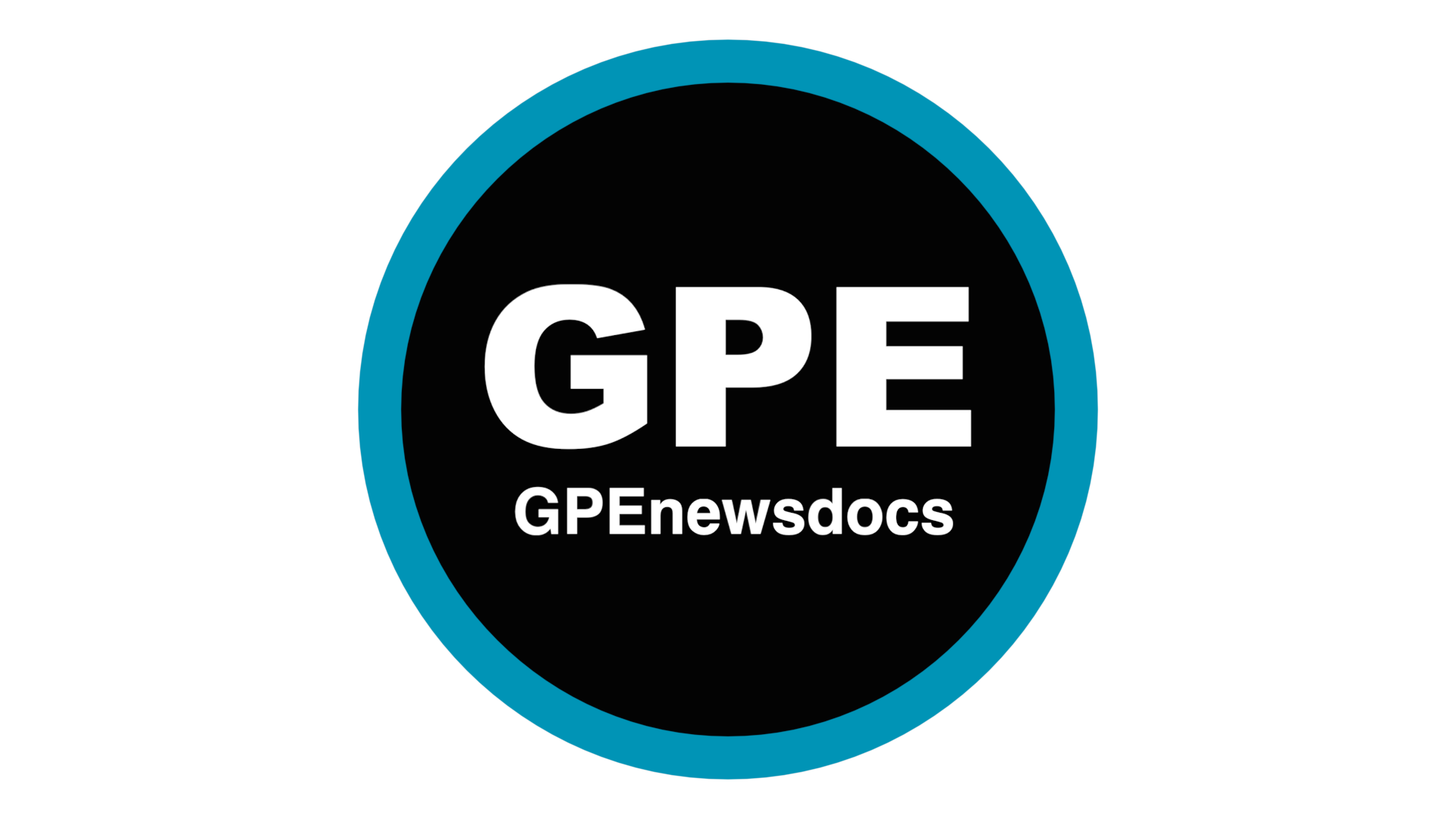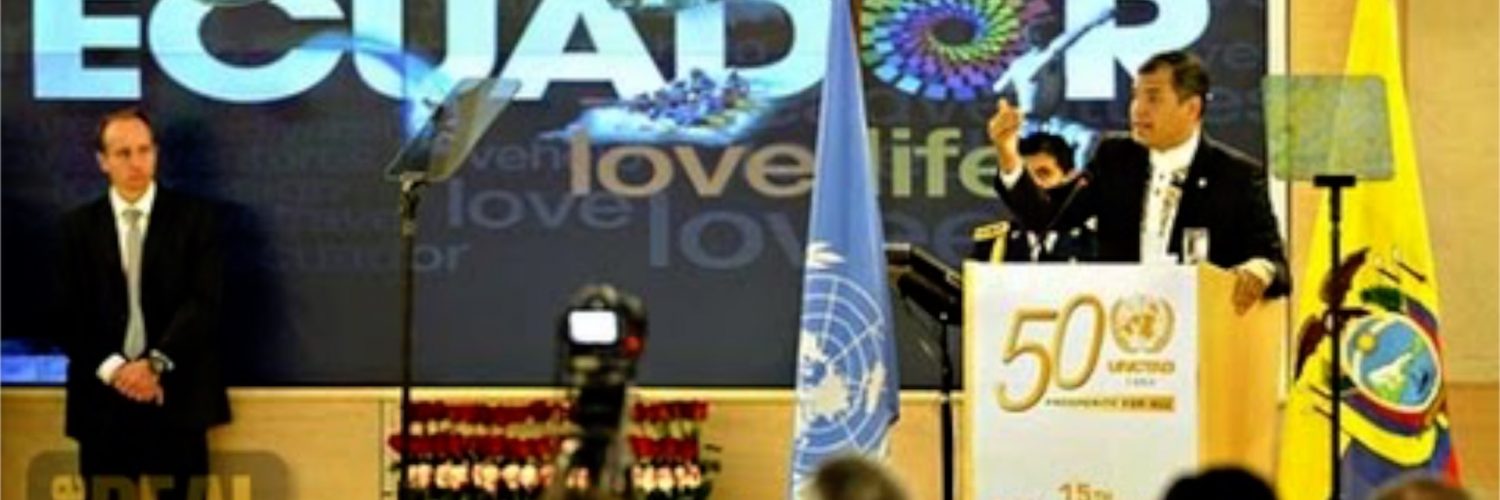“My friends, development is basically a political issue. The point of departure, the key question, is who is in charge of a society – the elite or the majorities? Capital or human beings? The market or society?” says President Correa of Ecuador delivering UNCTAD’s prestigious Prebisch Lecture at the UN Geneva. UNCTAD’s chief economist, Richard Kozul- Wright comments on the occasion and the lecture.
November 21, 2014 Produced by Lynn Fries
TRANSCRIPT
LYNN FRIES, TRNN PRODUCER: Welcome to The Real News. I’m Lynn Fries in Geneva.
Here in Geneva and marking a 50-year anniversary, the United Nations Conference on Trade and Development invited President Correa of Ecuador to deliver the 15th Prebisch Lecture, titled “Ecuador: Development as a Political Process”. Here’s a clip.
RAFAEL CORREA, PRESIDENT OF ECUADOR: El desarrollo es basicamente un probema political. El punto de partida, la pregunta clave es quien manda en una sociedad: las elites o las grandes mayorias? El capital o los seres humanos? El maercado o la sociedad?
(SUBTITLED TRANSLATION): My friends, development is basically a political issue. The point of departure, the key question, is who is in charge of a society–the elite or the majorities? Capital or human beings? The market or society?
FRIES: Here to talk to us about the importance of the speech is Richard Kozul-Wright. Richard Kozul-Wright is a senior economist at the United Nations, Geneva, and director of the Division on Globalization and Development at UNCTAD.
Richard, welcome, and thank you for joining us.
RICHARD KOZUL-WRIGHT, SENIOR ECONOMIST, GLOBALIZATION AND DEVELOPMENT DIV., UNCTAD: Thank you for the invitation, Lynn.
FRIES: In welcoming remarks at the lecture, UNCTAD Secretary-General Mukhisa Kituyi said that you at UNCTAD know that how a country deals with its own challenges is more important that any outside advice and he was keen to hear about Ecuador’s experience and what could be learned from it. You were at the lecture. So was I. It went on for over two hours. The room was at full capacity. It was one of the biggest rooms at the UN, Geneva, Room 20, the Human Rights Room. So I’d like to ask you, in the short time that we have, to try to explain to us what was it that President Correa had to say that so captivated an audience of representatives from all parts of the world who were clearly moved, as was obvious in the standing ovation they gave the lecture.
KOZUL-WRIGHT: Yeah, I think in a nutshell, Lynn, it was the idea–and the persuasive idea–that the president offered, that there is an alternative to the neoliberal agenda. I mean, obviously Latin America, as a continent, was one of the regions that was most heavily influenced by the Washingon Consensus in the ’80s and the ’90s. And it’s gone through this fairly remarkable transition to forging alternative economic and social agendas. And in many respects Ecuador is at the cutting edge of that search for more inclusive, more sustainable, more democratic alternatives to what much of the region was following in the ’80s and the ’90s. And he presented, in a very detailed, and very eloquent, and also very humorous way that you can do things differently. You can forge alternative development paths to those of conventional wisdom.
FRIES: So President Correa went into the question of why is it that North America developed so fast, whereas South America, with a history of advanced civilizations like the Aztecs, the Inca, the Maya, with huge technological skills, didn’t. So how did he explain that?
KOZUL-WRIGHT: Well, I think he offered a couple of explanations. One, I think, importantly, is the behavior of your elites. I mean, ultimately when you’re talking about market-based development models, a lot depends upon how your elite behaves. And if you have an elite that is conscious of the social consequences of their actions, is concerned to build up productive capacities that generate jobs that spread wealth more broadly, then you are more likely to get some kind of inclusive and sustainable development process emerging. So that’s an important ingredient in his story. I think it’s fairly familiar that the Latin American elites, going back centuries, not just decades, have tended to have had a very exclusive economic strategy that has not shared wealth in any equitable fashion. It’s why Latin America has one of the highest rates of inequality of any region in the world.
Of course, the second factor is the influence of the external environment and whether you have an external environment, whether the workings of global firms and markets encourages a sustainable and inclusive growth process at home or works against it. And, again, Latin America as a region has often found the external environment hostile to building those kinds of alternative strategies. And Correa is working, in a sense, on both fronts. He is trying forge, as I said, an alternative domestic agenda, building in different institutions, creating a different value system for the political elite, but also challenging some of the asymmetries of economic and political power at the global level that continue to frustrate development in many parts of the developing world, not just Latin America.
FRIES: So let’s take Ecuador’s domestic experience and its global experience one by one, starting with the domestic. The success of domestic policy implemented under Correa is well recognized. And Correa gava a detailed account of why he did not rely on textbooks or advice from international financial institutions. For example the mainstream recommendation of “Labor Market Flexibilization” was a euphemism, Correa explained, for a mechanism to exploit labor. But in the domestic agenda, what’s perhaps less well recognized is the work Correa’s doing with institutions. So talk about challenges and successes there. Give us some background on that.
KOZUL-WRIGHT: Yeah. I mean, if you go back to a decade or the late ’90s, early 2000s, obviously Ecuador suffered from hyperinflation. It had major balance of payments problems and kind of classic Latin American economic difficulties, despite–or, indeed, in many cases because of its following conventional economic wisdom. It dollarized its economy in 2000 as a desperate attempt to resolve these problems to some extent, and it brought down inflation, but it continued on a unsustainable and very unequal development path until Correa took over in 2007.
One of the consequences of that neoliberal agenda, of course, is to hollow out any sort of institutional role for an active state. And I think one of the things that Correa has done and is very important to the success of their agenda is to rebuild the institutions of what we at UNCTAD, at least, would call the developmental state, to fashion both a bureaucracy and, to some extent, non-state institutions that can begin to rebuild a higher level of social consensus and to shift the economic path in a way that brings a greater level of participation across the economic and social spectrum. And those institutions, they don’t come easily, they take years to build, but Correa has begun to start that path.
I think the second thing he’s done which is very important to ensuring that developmental states are effective is that he’s begun to rebuild the fiscal base of the economy. He’s done that in a couple of ways. Obviously, he’s successfully challenged the highly exploitative nature of international capital in his economy. Ecuador was an economy that was heavily dependent on primary exports for revenues–bananas and oil and flowers. And in the kind of contracts that previous governments have signed with these companies, Ecuador received a very small share of the returns. And Correa has successfully renegotiated contracts with international firms to ensure a higher level of revenue from those activities. At the same time, he’s also expanded the domestic fiscal base. I mean, he’s been successful particularly through a more progressive direct taxation system to improve domestic fiscal mobilization. So he’s begun to build the institutions of a developmental state and he’s begun to provide the resources that that state needs to create the kind of inclusive and sustainable alternatives he’s looking for.
FRIES: Infrastructure and education came across in the lecture as two areas where the Ecuadorian government was putting a lot of resources.
KOZUL–WRIGHT: And you’re seeing the payoffs. I mean, the figures that Correa gave on the declines of inequality, of the increases in minimum wages, on the commitment to raising the share of young people in education, are all very significant achievements of his seven years in office. He’s put the infrastructure–they’re beginning to put the infrastructure down that will hopefully lead to a more diversified economy, ’cause in the end that is the–in many respects is the bigger challenge that the Ecuadorian policymakers face now. It’s moving away from the dependence on commodities and achieving some degree of success in more sophisticated industrial activities.
And that’s the challenge I think that they are moving towards now. There’s a much greater emphasis, as he reflected in his lecture, on the need for industrial policy as part of a sustained and inclusive development strategy, the need to move into more knowledge-intensive and technology-intensive areas of production. And that’s a slower-moving challenge, I think, in many respects.
FRIES: And it’s a challenge that ties into Ecuador’s global experience. So let’s take that up next.
Please join us for part two in our conversation with Richard Kozul-Wright. Richard Kozul-Wright, thank you.
KOZUL-WRIGHT: Thank you.
FRIES: And thank you for joining us on The Real News Network.
END TRANSCRIPT
Richard Kozul-Wright, Director of the Division on Globalization and Development Strategies at the United Nations Conference on Trade and Development, is the author of Transforming Economies: Making Industrial Policy Work for Growth, Jobs and Development.
Originally published at TRNN



